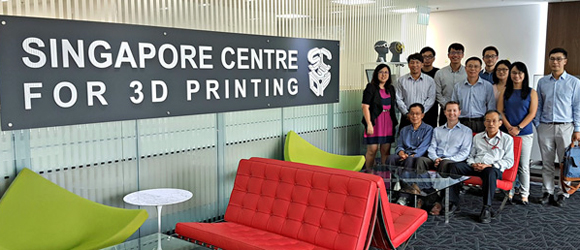Lloyd’s Register holds workshop on sustainable approaches to metal Additive Manufacturing
April 2, 2017

Attendees at Lloyd’s Register’s workshop on sustainable approaches to metal Additive Manufacturing (Courtesy LR)
Lloyd’s Register (LR), headquartered in London, UK, held a qualification workshop on sustainable approaches to metal Additive Manufacturing in March 2017 for Keppel Offshore and Marine and the Singapore Centre for 3D Printing at Nanyang Technological University, both based in Singapore. The workshop focused on the production of parts intended for rugged environments such as shipping and offshore oil and gas production.
Qualification is a critical step towards the certification and adoption of industrial products made by AM. The workshop focused on a holistic range of knowledge and skills required to demonstrate competency in AM, and also to meet industry quality and safety regulations and standards.
“The workshop covered the key risk areas of AM that we had examined before starting our AM programme,” stated Tan Kim Pong, Program Manager at Keppel Offshore and Marine Technology Centre. “The testing and inspection requirements were comprehensive and well thought out, which reinforced our confidence in this newly established manufacturing technology, which is fairly new to the industry. Moving forward, this workshop will serve as a platform in the development of our AM workflow, as well as understanding key engagement points with a third-party inspection organisation such as LR.”
The three-day workshop covered a range of topics including:
- Design – designs can be optimised for AM but both designer and designs must still meet stringent assessment against various codes and standards.
- Materials – feedstock (powder and wire) are considered some of the riskiest points for quality in the AM supply chain, and subsequently require the most stringent controls for procurement, handling, testing and mixing.
- Manufacturing – the AM process is subject to numerous system and human variables found within the setup, printing and control of the AM and auxiliary systems.
- Post-processing – part removal, thermal processing and final finishing all require planning and control in order to meet the technical delivery condition requirements.
- Inspection and testing – testing and inspection is mandatory in most cases to ensure produced parts are suitable for putting into service and meet design, material specification and legal requirements.
“These workshops represent a collaborative, knowledge-sharing approach to new technology adoption,” explained David Hardacre, LR’s AM Technical Lead and Workshop Leader. “Similar workshops are offered to clients globally to support them with cradle-to-grave considerations of AM – including business-case justification, facility requirements, risk assessment, health and safety considerations and material certification.”
















